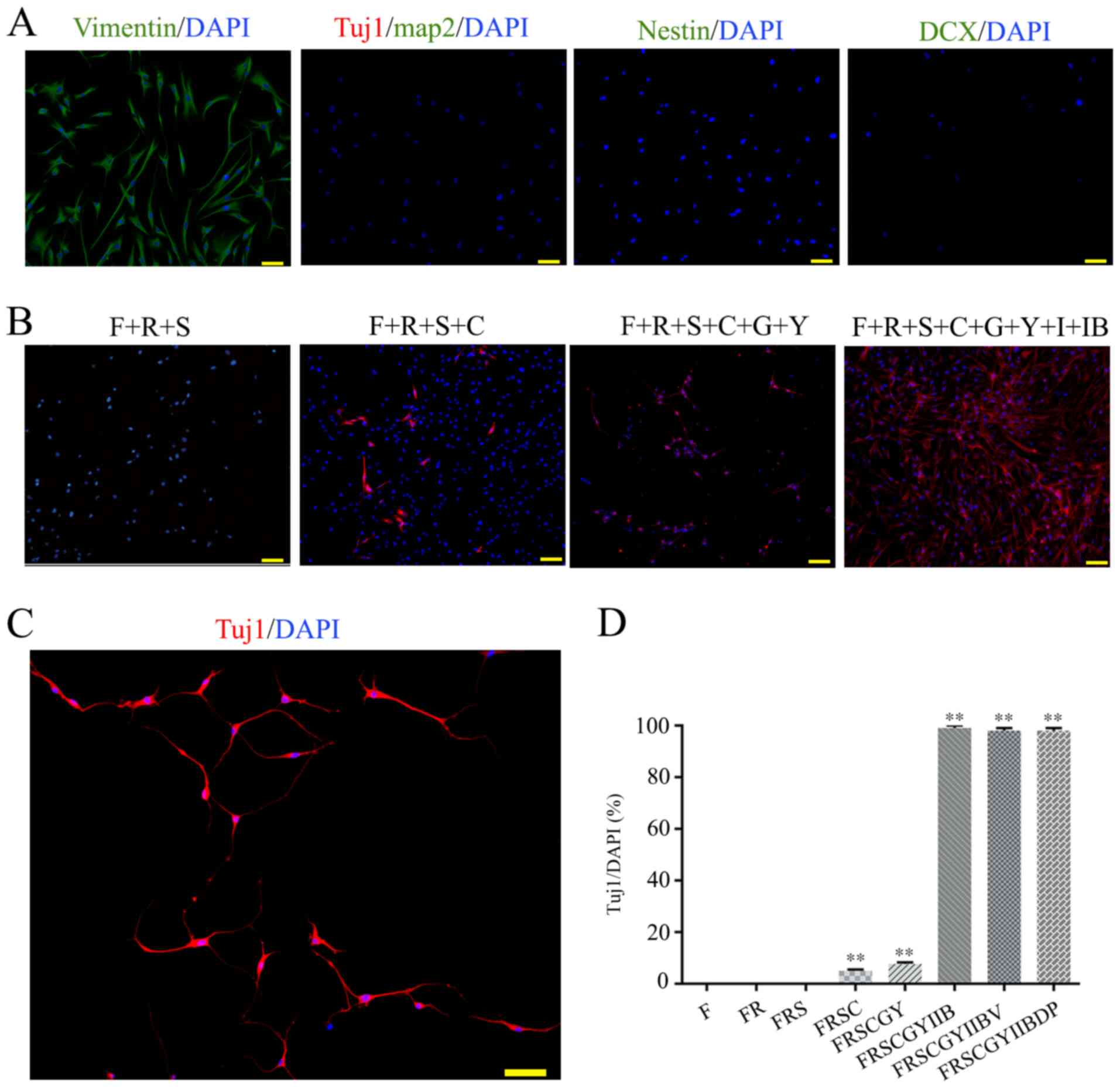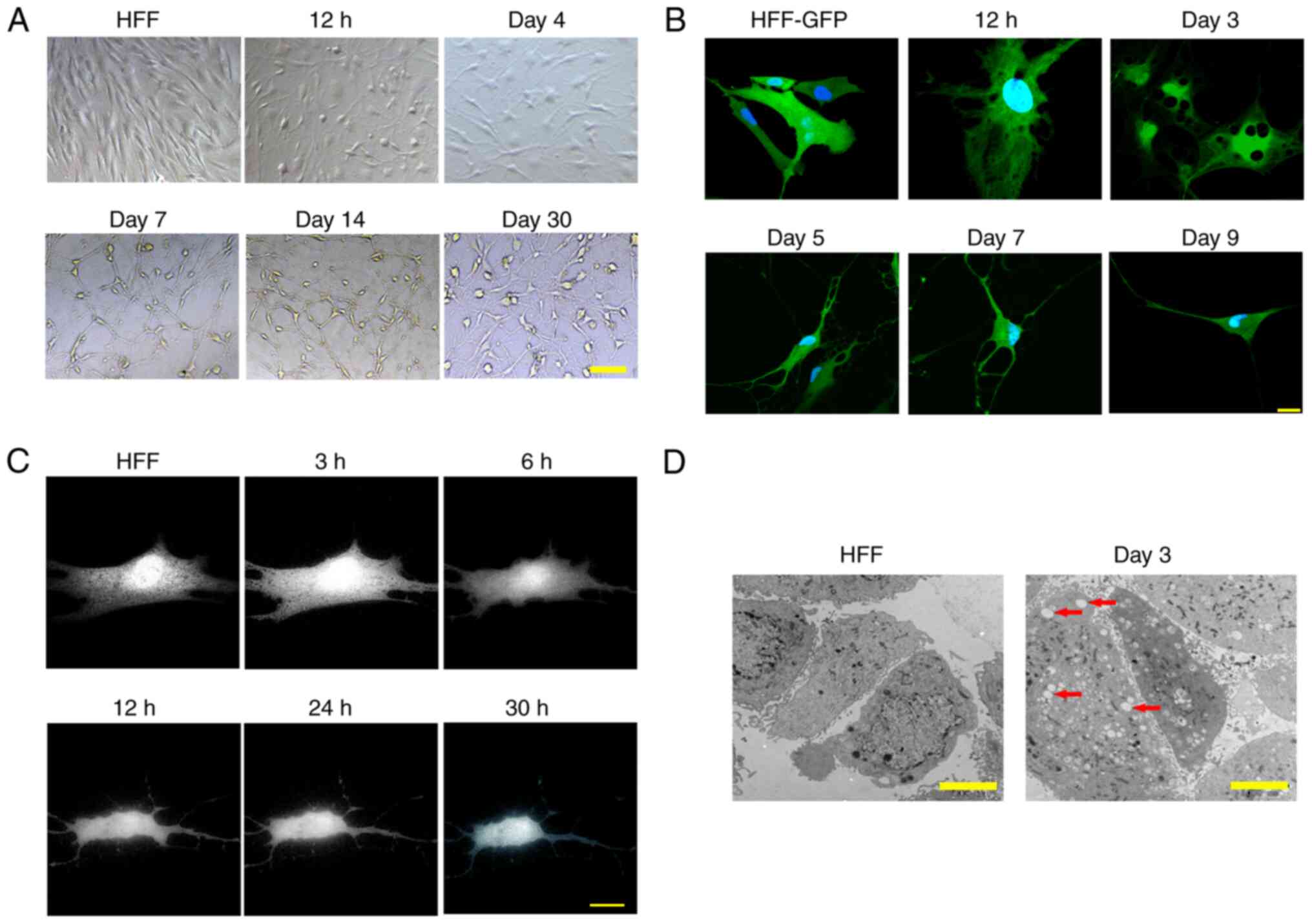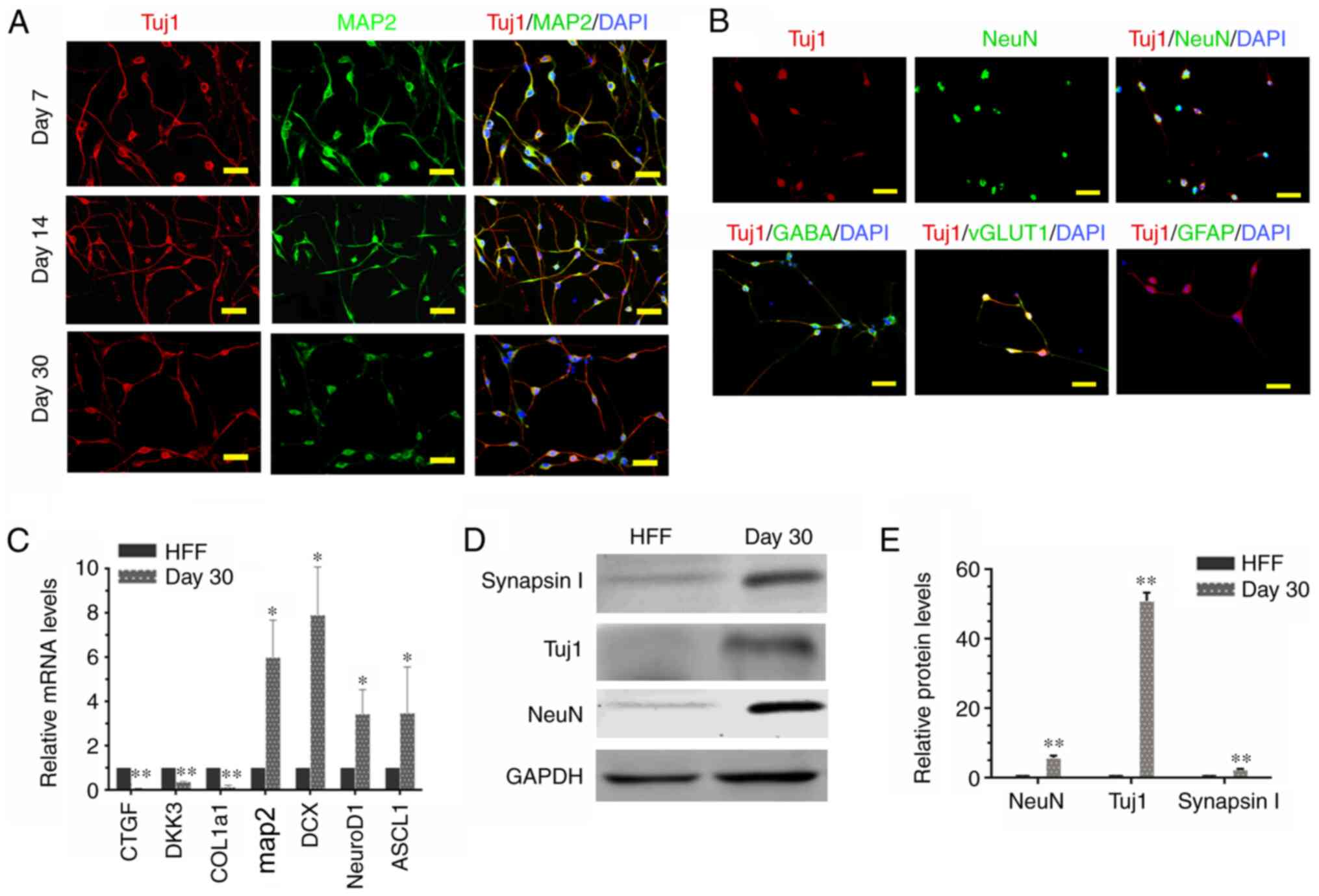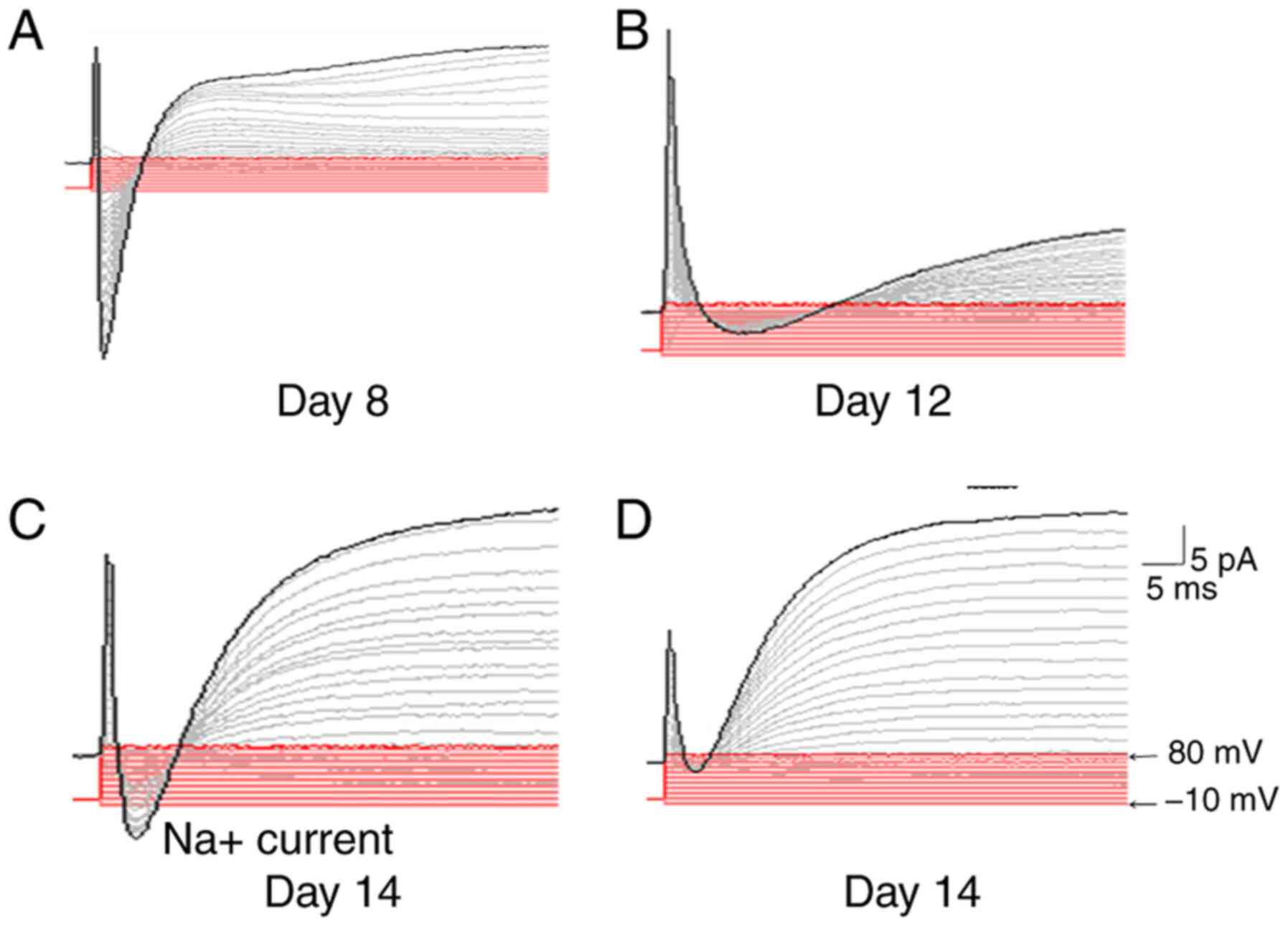|
1
|
Kumar A, Narayanan K, Chaudhary RK, Mishra
S, Kumar S, Vinoth KJ, Padmanabhan P and Gulyás B: Current
perspective of stem cell therapy in neurodegenerative and metabolic
diseases. Mol Neurobiol. 54:7276–7296. 2017. View Article : Google Scholar : PubMed/NCBI
|
|
2
|
Chanda S, Marro S, Wernig M and Sudhof TC:
Neurons generated by direct conversion of fibroblasts reproduce
synaptic phenotype caused by autism-associated neuroligin-3
mutation. Proc Natl Acad Sci USA. 110:16622–16627. 2013. View Article : Google Scholar : PubMed/NCBI
|
|
3
|
Liu ML, Zang T and Zhang CL: Direct
lineage reprogramming reveals disease-specific phenotypes of motor
neurons from human ALS patients. Cell Rep. 14:115–128. 2016.
View Article : Google Scholar : PubMed/NCBI
|
|
4
|
Sahni V and Kessler JA: Stem cell
therapies for spinal cord injury. Nat Rev Neurol. 6:363–372. 2010.
View Article : Google Scholar : PubMed/NCBI
|
|
5
|
Takahashi K and Yamanaka S: Induction of
pluripotent stem cells from mouse embryonic and adult fibroblast
cultures by defined factors. Cell. 126:663–676. 2006. View Article : Google Scholar : PubMed/NCBI
|
|
6
|
Hyun I, Lindvall O, Ahrlund-Richter L,
Cattaneo E, Cavazzana-Calvo M, Cossu G, De Luca M, Fox IJ, Gerstle
C, Goldstein RA, et al: New ISSCR guidelines underscore major
principles for responsible translational stem cell research. Cell
Stem Cell. 3:607–609. 2008. View Article : Google Scholar : PubMed/NCBI
|
|
7
|
Rosemann A: Stem cell treatments for
neurodegenerative diseases: Challenges from a science, business and
healthcare perspective. Neurodegener Dis Manag. 5:85–87. 2015.
View Article : Google Scholar : PubMed/NCBI
|
|
8
|
Hu W, Qiu B, Guan W, Wang Q, Wang M, Li W,
Gao L, Shen L, Huang Y, Xie G, et al: Direct conversion of normal
and Alzheimer's disease human fibroblasts into neuronal cells by
small molecules. Cell Stem Cell. 17:204–212. 2015. View Article : Google Scholar : PubMed/NCBI
|
|
9
|
Li X, Zuo X, Jing J, Ma Y, Wang J, Liu D,
Zhu J, Du X, Xiong L, Du Y, et al: Small-molecule-driven direct
reprogramming of mouse fibroblasts into functional neurons. Cell
Stem Cell. 17:195–203. 2015. View Article : Google Scholar : PubMed/NCBI
|
|
10
|
Pfisterer U, Ek F, Lang S, Soneji S,
Olsson R and Parmar M: Small molecules increase direct neural
conversion of human fibroblasts. Sci Rep. 6:382902016. View Article : Google Scholar : PubMed/NCBI
|
|
11
|
Qin H, Zhao A, Ma K and Fu X: Chemical
conversion of human and mouse fibroblasts into motor neurons. Sci
China Life Sci. 61:1151–1167. 2018. View Article : Google Scholar : PubMed/NCBI
|
|
12
|
Yang Y, Chen R, Wu X, Zhao Y, Fan Y, Xiao
Z, Han J, Sun L, Wang X and Dai J: Rapid and efficient conversion
of human fibroblasts into functional neurons by small molecules.
Stem Cell Reports. 13:862–876. 2019. View Article : Google Scholar : PubMed/NCBI
|
|
13
|
Livak KJ and Schmittgen TD: Analysis of
relative gene expression data using real-time quantitative PCR and
the 2(-Delta Delta C(T)) method. Methods. 25:402–408. 2001.
View Article : Google Scholar : PubMed/NCBI
|
|
14
|
Huangfu D, Maehr R, Guo W, Eijkelenboom A,
Snitow M, Chen AE and Melton DA: Induction of pluripotent stem
cells by defined factors is greatly improved by small-molecule
compounds. Nat Biotechnol. 26:795–797. 2008. View Article : Google Scholar : PubMed/NCBI
|
|
15
|
Ladewig J, Mertens J, Kesavan J, Doerr J,
Poppe D, Glaue F, Herms S, Wernet P, Kögler G, Müller FJ, et al:
Small molecules enable highly efficient neuronal conversion of
human fibroblasts. Nat Methods. 9:575–578. 2012. View Article : Google Scholar : PubMed/NCBI
|
|
16
|
Madhu V, Dighe AS, Cui Q and Deal DN: Dual
inhibition of activin/Nodal/TGF-β and BMP signaling pathways by
SB431542 and dorsomorphin induces neuronal differentiation of human
adipose derived stem cells. Stem Cells Int. 2016:10353742016.
View Article : Google Scholar : PubMed/NCBI
|
|
17
|
Lamas NJ, Johnson-Kerner B, Roybon L, Kim
YA, Garcia-Diaz A, Wichterle H and Henderson CE: Neurotrophic
requirements of human motor neurons defined using amplified and
purified stem cell-derived cultures. PLoS One. 9:e1103242014.
View Article : Google Scholar : PubMed/NCBI
|
|
18
|
Li W, Zhou H, Abujarour R, Zhu S, Young
Joo J, Lin T, Hao E, Schöler HR, Hayek A and Ding S: Generation of
human-induced pluripotent stem cells in the absence of exogenous
Sox2. Stem Cells. 27:2992–3000. 2009.PubMed/NCBI
|
|
19
|
Ambasudhan R, Talantova M, Coleman R, Yuan
X, Zhu S, Lipton SA and Ding S: Direct reprogramming of adult human
fibroblasts to functional neurons under defined conditions. Cell
Stem Cell. 9:113–118. 2011. View Article : Google Scholar : PubMed/NCBI
|
|
20
|
Guillemot F: Spatial and temporal
specification of neural fates by transcription factor codes.
Development. 134:3771–3780. 2007. View Article : Google Scholar : PubMed/NCBI
|
|
21
|
Pang ZP, Yang N, Vierbuchen T, Ostermeier
A, Fuentes DR, Yang TQ, Citri A, Sebastiano V, Marro S, Südhof TC
and Wernig M: Induction of human neuronal cells by defined
transcription factors. Nature. 476:220–223. 2011. View Article : Google Scholar : PubMed/NCBI
|
|
22
|
Hou PS, Chuang CY, Yeh CH, Chiang W, Liu
HJ, Lin TN and Kuo HC: Direct conversion of human fibroblasts into
neural progenitors using transcription factors enriched in human
ESC-Derived neural progenitors. Stem Cell Reports. 8:54–68. 2017.
View Article : Google Scholar : PubMed/NCBI
|
|
23
|
Kim SM, Flasskamp H, Hermann A,
Araúzo-Bravo MJ, Lee SC, Lee SH, Seo EH, Lee SH, Storch A, Lee HT,
et al: Direct conversion of mouse fibroblasts into induced neural
stem cells. Nat Protoc. 9:871–881. 2014. View Article : Google Scholar : PubMed/NCBI
|
|
24
|
Caiazzo M, Giannelli S, Valente P, Lignani
G, Carissimo A, Sessa A, Colasante G, Bartolomeo R, Massimino L,
Ferroni S, et al: Direct conversion of fibroblasts into functional
astrocytes by defined transcription factors. Stem Cell Reports.
4:25–36. 2015. View Article : Google Scholar : PubMed/NCBI
|
|
25
|
Biswas D and Jiang P: Chemically induced
reprogramming of somatic cells to pluripotent stem cells and neural
cells. Int J Mol Sci. 17:2262016. View Article : Google Scholar : PubMed/NCBI
|
|
26
|
Fritz AL, Adil MM, Mao SR and Schaffer DV:
cAMP and EPAC signaling functionally replace OCT4 during induced
pluripotent stem cell reprogramming. Mol Ther. 23:952–963. 2015.
View Article : Google Scholar : PubMed/NCBI
|
|
27
|
Hou P, Li Y, Zhang X, Liu C, Guan J, Li H,
Zhao T, Ye J, Yang W, Liu K, et al: Pluripotent stem cells induced
from mouse somatic cells by small-molecule compounds. Science.
341:651–654. 2013. View Article : Google Scholar : PubMed/NCBI
|
|
28
|
Ichida JK, Blanchard J, Lam K, Son EY,
Chung JE, Egli D, Loh KM, Carter AC, Di Giorgio FP, Koszka K, et
al: A small-molecule inhibitor of tgf-Beta signaling replaces sox2
in reprogramming by inducing nanog. Cell Stem Cell. 5:491–503.
2009. View Article : Google Scholar : PubMed/NCBI
|
|
29
|
Sato N, Meijer L, Skaltsounis L, Greengard
P and Brivanlou AH: Maintenance of pluripotency in human and mouse
embryonic stem cells through activation of Wnt signaling by a
pharmacological GSK-3-specific inhibitor. Nat Med. 10:55–63. 2004.
View Article : Google Scholar : PubMed/NCBI
|
|
30
|
Chapman S, Liu X, Meyers C, Schlegel R and
McBride AA: Human keratinocytes are efficiently immortalized by a
Rho kinase inhibitor. J Clin Invest. 120:2619–2626. 2010.
View Article : Google Scholar : PubMed/NCBI
|
|
31
|
Huangfu D, Osafune K, Maehr R, Guo W,
Eijkelenboom A, Chen S, Muhlestein W and Melton DA: Induction of
pluripotent stem cells from primary human fibroblasts with only
Oct4 and Sox2. Nat Biotechnol. 26:1269–1275. 2008. View Article : Google Scholar : PubMed/NCBI
|
|
32
|
Yoshida Y, Takahashi K, Okita K, Ichisaka
T and Yamanaka S: Hypoxia enhances the generation of induced
pluripotent stem cells. Cell Stem Cell. 5:237–241. 2009. View Article : Google Scholar : PubMed/NCBI
|
|
33
|
Dimmer KS and Scorrano L: (De)constructing
mitochondria: What for? Physiology (Bethesda). 21:233–241.
2006.PubMed/NCBI
|
|
34
|
Prieto J, Leon M, Ponsoda X, García-García
F, Bort R, Serna E, Barneo-Muñoz M, Palau F, Dopazo J, López-García
C and Torres J: Dysfunctional mitochondrial fission impairs cell
reprogramming. Cell Cycle. 15:3240–3250. 2016. View Article : Google Scholar : PubMed/NCBI
|
|
35
|
Prieto J, Leon M, Ponsoda X, Sendra R,
Bort R, Ferrer-Lorente R, Raya A, López-García C and Torres J:
Early ERK1/2 activation promotes DRP1-dependent mitochondrial
fission necessary for cell reprogramming. Nat Commun. 7:111242016.
View Article : Google Scholar : PubMed/NCBI
|
|
36
|
Spitz F and Furlong EE: Transcription
factors: From enhancer binding to developmental control. Nat Rev
Genet. 13:613–626. 2012. View Article : Google Scholar : PubMed/NCBI
|
|
37
|
Vierbuchen T, Ostermeier A, Pang ZP,
Kokubu Y, Sudhof TC and Wernig M: Direct conversion of fibroblasts
to functional neurons by defined factors. Nature. 463:1035–1041.
2010. View Article : Google Scholar : PubMed/NCBI
|
|
38
|
Pataskar A, Jung J, Smialowski P, Noack F,
Calegari F, Straub T and Tiwari VK: NeuroD1 reprograms chromatin
and transcription factor landscapes to induce the neuronal program.
EMBO J. 35:24–45. 2016. View Article : Google Scholar : PubMed/NCBI
|
|
39
|
Aprea J, Nonaka-Kinoshita M and Calegari
F: Generation and characterization of Neurod1-CreER(T2) mouse lines
for the study of embryonic and adult neurogenesis. Genesis.
52:870–878. 2014. View Article : Google Scholar : PubMed/NCBI
|
|
40
|
Lee JK, Cho JH, Hwang WS, Lee YD, Reu DS
and Suh-Kim H: Expression of neuroD/BETA2 in mitotic and
postmitotic neuronal cells during the development of nervous
system. Dev Dyn. 217:361–367. 2000. View Article : Google Scholar : PubMed/NCBI
|
|
41
|
Imayoshi I and Kageyama R: bHLH factors in
self-renewal, multipotency, and fate choice of neural progenitor
cells. Neuron. 82:9–23. 2014. View Article : Google Scholar : PubMed/NCBI
|
|
42
|
Wapinski OL, Vierbuchen T, Qu K, Lee QY,
Chanda S, Fuentes DR, Giresi PG, Ng YH, Marro S, Neff NF, et al:
Hierarchical mechanisms for direct reprogramming of fibroblasts to
neurons. Cell. 155:621–635. 2013. View Article : Google Scholar : PubMed/NCBI
|
|
43
|
Shi Z, Zhang J, Chen S, Li Y, Lei X, Qiao
H, Zhu Q, Hu B, Zhou Q and Jiao J: Conversion of fibroblasts to
parvalbumin neurons by one transcription factor, Ascl1, and the
chemical compound forskolin. J Biol Chem. 291:13560–13570. 2016.
View Article : Google Scholar : PubMed/NCBI
|


















